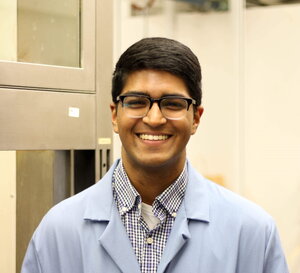The Fannie and John Hertz Foundation, a nonprofit organization dedicated to empowering the most promising innovators in science and technology, has announced the 2023 Hertz Fellows, and this new class of 15 remarkable doctoral students in applied science, engineering and mathematics includes Illinois chemistry alum Phil Kocheril (BS, '21).
By funding their graduate studies for five years, Hertz Fellowships provide each new fellow the freedom to tackle some of the most significant challenges facing our nation and the world today. Their research promises to improve human health, usher in advances in artificial intelligence and quantum technologies that redound to the greater good, yield a deeper understanding of our universe, contribute to our economy, and strengthen our national security. We project such outcomes with confidence based on the collective accomplishments of the more than 1,200 Hertz Fellows whose ranks they are joining.
There's a unique character to Hertz Fellows — curious, self-aware — they have a fire in their bellies and a desire to share their research,” says Stephen Fantone, chair of the Hertz Foundation Board of Directors. “For over two centuries, incredible achievements have emerged from the values fostered in this country and the synthesis of intellectual minds. The Hertz Foundation today plays an integral part in driving such innovation by enabling the freedom to innovate and helping these extraordinary scientists and engineers realize their potential.”
Currently a doctoral student in physical chemistry at the California Institute of Technology, Philip Kocheril seeks to use advanced spectroscopic techniques to characterize the photophysical dynamics of biochemical systems. Kocheril’s twin interests in chemistry and jazz developed early and continued into his undergraduate studies at the University of Illinois at Urbana-Champaign (UIUC). Kocheril started doing research as a high school student and continued during his undergraduate studies in chemistry at Illinois, working in the labs of Professor Benjamin McCall and Professor Steven Zimmerman on infrared spectroscopy, organic synthesis and computational modeling projects.
Phil Kocheril credits his older brother, fellow Illinois chemistry alum Stephen Kocheril (BS, '16), as the person who most inspired him on his path to becoming a scientist. Phil said his first exposure to chemistry research in a lab was with his brother when Stephen was an undergraduate at UIUC.
"That was my first exposure to research, and I have been hooked ever since," Phil said (in the video interview below).
As an undergraduate student, Phil Kocheril was active in the UIUC jazz program, holding the solo trumpet chair in the UIUC Concert Jazz Band, and being the only non-music major in the trumpet studio of Professor Tito Carrillo. An avid composer with diverse musical influences, Kocheril has written over 50 original compositions to date, one of which, “Up the Down Staircase,” was featured on Carrillo’s new album, “Urbanessence.” He was a Barry M. Goldwater Scholar and the first to receive the Astronaut Scholarship at UIUC.
After graduating from UIUC in 2021 with a bachelor’s in chemistry and minor in music, Kocheril developed biosensor assays and instrumentation, and studied lipoprotein biophysics as a post-bachelor’s student in the Physical Chemistry and Applied Spectroscopy Group at Los Alamos National Laboratory. He is also a National Science Foundation Graduate Research Fellow. Outside of research and coursework, Kocheril enjoys reading, cooking and playing games with friends.
The 2023 Hertz Fellows announcement.
Hertz Fellows comprise a true, multi-generational community of dedicated scientists, a unique engine for professional development and collaboration. That collaboration has borne significant fruit. Among past recipients are Nobel laureate John Mather, a NASA astrophysicist and project scientist for the James Webb Space Telescope; Kimberly Budil, director of Lawrence Livermore National Laboratory; Nathan Myhrvold, founder and CEO of Intellectual Ventures, founding director of Microsoft Research, and former chief technology officer at Microsoft; Kathleen Fisher, deputy office director for the Defense Advanced Research Projects Agency Information Innovation Office; and neuroscientist Ed Boyden of the Massachusetts Institute of Technology, who is developing optogenetic technologies to understand and treat brain conditions such as Parkinson’s disease and Alzheimer's disease.
The rigorous and proven selection process for fellows — interview-based and unlike any other fellowship’s process — is led by Philip Welkhoff, Hertz Fellow and Hertz board director and director of the malaria program at the Bill & Melinda Gates Foundation. The aim of the Hertz Fellowship selection process: identify doctoral students with the extraordinary creativity necessary to tackle problems others can’t solve.
“A Hertz Fellowship not only provides catalytic support during one’s graduate career; being awarded a fellowship welcomes fellows into a community that can accelerate impact for a lifetime,” says Welkhoff. “The innovation, creativity, deep and connected knowledge, grit and determination, and ambition to make an impact displayed by this cohort stand out and promise great things for the years to come. We are all excited to see the advances they develop over their careers that will drive progress across so many areas of endeavor, resulting in new scientific knowledge, new technologies, and strengthened national security.”
